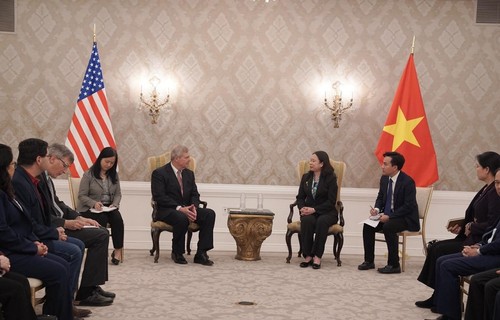US To Restrict Foreign Officials Over Social Media Policies

Table of Contents
Reasons Behind the New Restrictions
The impetus behind these new restrictions is twofold: countering disinformation and protecting national security. Both are critical concerns in the current geopolitical landscape.
Countering Disinformation and Propaganda
The US government is increasingly alarmed by the spread of disinformation and propaganda campaigns orchestrated by foreign governments through social media platforms. These campaigns pose a significant threat to democratic processes and societal stability.
- Foreign actors using social media to interfere in US elections: Foreign influence operations have been implicated in manipulating public opinion and attempting to sway election outcomes.
- Spread of false narratives and conspiracy theories designed to undermine public trust: The deliberate dissemination of misinformation erodes public trust in institutions and media, creating fertile ground for instability.
- Amplification of divisive rhetoric to exacerbate social and political tensions: Social media algorithms often amplify inflammatory content, contributing to polarization and societal fragmentation. This is a key concern in the context of US social media restrictions on foreign officials.
Protecting National Security
Beyond disinformation, the restrictions aim to enhance national security by limiting foreign officials' access to sensitive information and strategic planning discussions.
- Preventing espionage and intelligence gathering through social media monitoring: Foreign entities may attempt to glean intelligence from publicly available social media posts and interactions.
- Minimizing the risk of leaks and compromises of sensitive data: Social media posts, even seemingly innocuous ones, can inadvertently reveal valuable information.
- Identifying and disrupting foreign influence operations targeting US infrastructure: Social media can be used to coordinate attacks against critical infrastructure or spread misinformation related to national security.
Specific Measures and Policies
The US government is likely to employ a multi-pronged approach to regulate foreign officials' social media use, combining various measures and policies.
Visa Restrictions and Sanctions
The US may utilize visa restrictions and financial sanctions against foreign officials engaged in malicious social media activity. This represents a powerful tool for deterring such behavior.
- Denial of visas for officials deemed to be spreading disinformation: This could significantly limit the ability of foreign officials to travel to the US.
- Freezing assets of individuals and entities involved in coordinated campaigns: Financial sanctions can cripple the resources used to fund disinformation efforts.
- Imposing travel bans on those deemed a threat to national security: Travel bans further restrict the movement and activities of individuals posing a threat.
Enhanced Social Media Monitoring
The US government will likely enhance its monitoring of foreign officials' social media activity using advanced technologies and intelligence gathering techniques.
- Increased collaboration with social media platforms to identify and flag suspicious accounts: Partnerships with platforms are crucial for identifying and addressing problematic content promptly.
- Development of sophisticated algorithms to detect patterns of disinformation: Artificial intelligence and machine learning can help identify subtle patterns indicative of coordinated disinformation campaigns.
- Investment in human intelligence to analyze social media content and identify actors: Human analysts play a vital role in interpreting complex social media data and identifying key actors.
Potential Impacts and Criticisms
While the stated goals are laudable, the new restrictions on US social media by foreign officials are not without potential drawbacks and criticisms.
Impact on Diplomacy and International Relations
These restrictions could negatively affect diplomatic relations with certain countries, potentially hindering diplomatic efforts and creating further international tensions.
- Potential for retaliatory measures by other countries: Other nations might implement similar or retaliatory measures, escalating tensions.
- Impact on freedom of speech and expression: Concerns exist about the potential impact on legitimate communication and the exchange of ideas.
- Difficulties in distinguishing between legitimate engagement and disinformation: Defining and identifying disinformation can be challenging, potentially leading to unintended consequences.
Concerns about Censorship and Free Speech
Critics argue that these restrictions may infringe upon freedom of speech and expression, potentially leading to unintended consequences. Balancing national security with individual liberties is a key challenge.
- Potential for overreach and targeting of legitimate dissent: The line between legitimate expression and disinformation can be blurry.
- Importance of transparency and accountability in the implementation of these policies: Transparency is crucial to ensure the fairness and legitimacy of these measures.
- Need for clear guidelines and due process to avoid arbitrary restrictions: Clear guidelines and established processes are necessary to prevent abuse and ensure due process.
Conclusion
The US government's decision to restrict foreign officials' social media activities represents a significant shift in its foreign policy approach. While the aim to counter disinformation and safeguard national security is understandable, it's crucial to acknowledge the potential negative impacts on international relations and the freedom of speech. Careful monitoring and evaluation of these new policies are paramount to ensure effectiveness while avoiding unintended consequences. Understanding the complexities surrounding US social media restrictions on foreign officials is critical for navigating the evolving landscape of international relations and online security. Stay informed about updates and further developments concerning these important policy changes.

Featured Posts
-
 Elon Musks Daughter Vivian Modeling Debut Sparks Debate
May 30, 2025
Elon Musks Daughter Vivian Modeling Debut Sparks Debate
May 30, 2025 -
 Trzy Lata Po Katastrofie Na Odrze Wysokie Ryzyko Powtorki
May 30, 2025
Trzy Lata Po Katastrofie Na Odrze Wysokie Ryzyko Powtorki
May 30, 2025 -
 France Et Vietnam Une Cooperation Accrue Pour Une Mobilite Plus Durable
May 30, 2025
France Et Vietnam Une Cooperation Accrue Pour Une Mobilite Plus Durable
May 30, 2025 -
 Malaysia Feels The Heat Us Imposes Solar Import Duties
May 30, 2025
Malaysia Feels The Heat Us Imposes Solar Import Duties
May 30, 2025 -
 House Of Kong An Immersive Gorillaz 25th Anniversary Exhibition
May 30, 2025
House Of Kong An Immersive Gorillaz 25th Anniversary Exhibition
May 30, 2025
